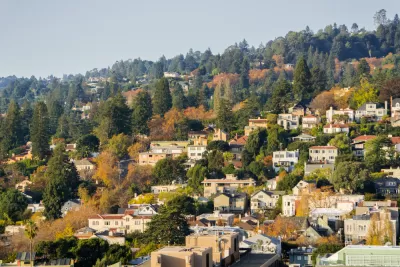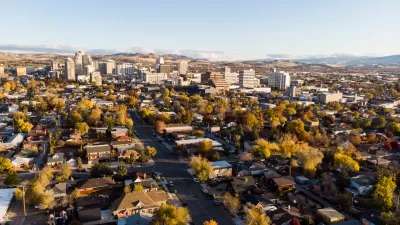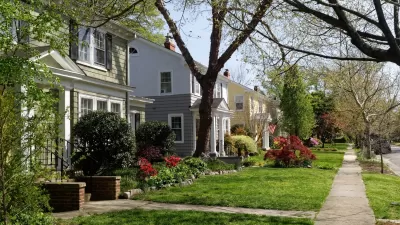A regulation limiting the number and size of ADUs in the Berkeley Hills runs afoul of state law, but supporters say it protects the safety of residents in fire-prone areas.

A state agency has ruled against Berkeley’s restrictions on accessory dwelling units (ADUs) in its hillside neighborhoods, reports Nico Savidge for Berkeleyside, dismissing the city’s claims that allowing two ADUs per lot in the Berkeley Hills would negatively impact resident safety in the event of a fire evacuation.
As Savidge explains, “Berkeley’s regulations allow accessory units to be built throughout the city. But whereas homeowners in the flatlands can build two such units on the same property — both a detached cottage and a ‘junior ADU,’ such as a basement apartment — they are only allowed one accessory unit on properties that lie in areas Berkeley classifies as Very High Fire Hazard Severity Zones.” According to Savidge, “David Zisser, an assistant deputy director for local government relations and accountability at the Department of Housing and Community Development, struck down that reasoning in an Oct. 17 letter to Berkeley Planning Director Jordan Klein,” writing that “the city has not adequately demonstrated that new ADUs will actually impact public safety.” Critics see the restriction as another way for cities to limit new housing construction in some of their wealthiest areas.
Councilmember Susan Wengraf, who represents much of the Berkeley Hills, said that “state regulators are being too inflexible with the ADU law and should have provided more leeway for cities that are at risk from wildfire to limit construction.” Wengraf says she will discuss the issue further before deciding whether to challenge HCD’s decision.
FULL STORY: Berkeley rules limiting ADUs in hills violate state law, housing agency says

Alabama: Trump Terminates Settlements for Black Communities Harmed By Raw Sewage
Trump deemed the landmark civil rights agreement “illegal DEI and environmental justice policy.”

Study: Maui’s Plan to Convert Vacation Rentals to Long-Term Housing Could Cause Nearly $1 Billion Economic Loss
The plan would reduce visitor accommodation by 25% resulting in 1,900 jobs lost.

Planetizen Federal Action Tracker
A weekly monitor of how Trump’s orders and actions are impacting planners and planning in America.

Study Links Covid and Poor Driving
The effects of the virus, including ‘brain fog,’ can make driving more difficult and dangerous.

Waymo Gets Permission to Map SF’s Market Street
If allowed to operate on the traffic-restricted street, Waymo’s autonomous taxis would have a leg up over ride-hailing competitors — and counter the city’s efforts to grow bike and pedestrian on the thoroughfare.

Parklet Symposium Highlights the Success of Shared Spaces
Parklets got a boost during the Covid-19 pandemic, when the concept was translated to outdoor dining programs that offered restaurants a lifeline during the shutdown.
Urban Design for Planners 1: Software Tools
This six-course series explores essential urban design concepts using open source software and equips planners with the tools they need to participate fully in the urban design process.
Planning for Universal Design
Learn the tools for implementing Universal Design in planning regulations.
Caltrans
Smith Gee Studio
Institute for Housing and Urban Development Studies (IHS)
City of Grandview
Harvard GSD Executive Education
Toledo-Lucas County Plan Commissions
Salt Lake City
NYU Wagner Graduate School of Public Service





























